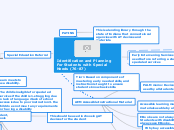
Identification and Planning For Students with Special Needs (76-87)
Early Intervening Services: services used before referring a student to special ed services
Student Support Teams
Response to Intervention (RTI)
Special Education Referral
Referal can be made by school professional or the child's parents.
The school has 60 to complete evaluation process.
Composed of team of specialist who work with gen ed teacher to find an intervention strategy for the student. The intervention is evaluated, if it does not work student is referred for Special Ed services.
3 Tier approach with close progress monitoring. If this approach is unsuccessful, student is referred for special ed services.
Tier 3 is more intense than tier 2 and focuses on specific skills and is provided in addition to general education curriculum.
Tier 2, more intensive approach 15-30 minutes spent in small group instruction. (usually daily)
Parents must give written consent for evaluation to begin.
After this time, the IEP team meets to determine if the child has a disability.
The child is ineligible for special ed services if the child is 1. struggling due to lack of language 2.lack of school success is due to poor instruction 3. the child does not meet any requirements for having a disability
The student is said to need special education services, and the IEP team proceeds in the process.
PLLAAFP (Present Level of Academic Achievement and Functional Performance)
